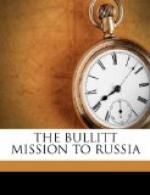The chairman. At that time?
Mr. Bullitt. And I was asked to enter the Department of State, to work in the Division of Western European Affairs under Mr. Grew, in which my special province was to follow the political situation of Germany and Austria-Hungary, to prepare the confidential reports of the department on Germany, Austria, and Hungary—the weekly reports—and also such memoranda on conditions as the President and the Secretary and others might call for.
The chairman. And then you went to Paris as a member of the staff, after the armistice?
Mr. Bullitt. Yes; I was an employee of the department at the time of the armistice, and I was ordered to Paris as a member of the staff of the commission.
Senator Knox. When did you first go to Paris, Mr. Bullitt?
Mr. Bullitt. I sailed on the George Washington. I went over with the original trip of the President.
Senator Knox. And you were there continuously how long?
Mr. Bullitt. I remained in Paris until—I can give you the exact date—I was ordered to go on a special mission to Berne about the first week of February. I can give you the exact date, if it is of any moment.
Senator Knox. No; it is not.
Mr. Bullitt. I remained a week in Berne,
then returned and remained in
Paris until I was ordered to go to Russia.
I left for Russia on the 22d of February. I was in Paris during the entire period until the 22d of February. Senator Knox. You said you went over on the original trip of the President. Just to get these dates right, when did you reach Paris?
Mr. Bullitt. I left New York on December 4 and, as I remember, we reached Paris on December 13.
Senator Knox. And you were there, then, until you went to Berne in February?
Mr. Bullitt. In February,
Senator Knox. What was your personal relation to the peace conference and its work?
MR. BULLITT’S OFFICIAL STATUS
Mr. Bullitt. When I first arrived I was asked to take charge of a confidential bulletin which was to be gotten out for the benefit of the commissioners each morning. It was to be read by them. That lasted a very short time, and as is usual with most things of the kind, we discovered that the commissioners did not care to spend the time reading it, and therefore it was decided to abolish this bulletin, and that instead I should receive all the intelligence reports of military intelligence, of the State Department, intelligence received through all the special dispatches of the ambassadors, etc., in fact, all the information that came in, and a section was created called the Current Intelligence Section. I was called the Chief of the Division of Current Intelligence Summaries.




